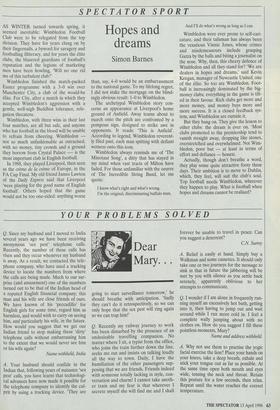SPECTATOR SPORT
Hopes and dreams
Simon Barnes
AS WINTER turned towards spring, it seemed inevitable: Wimbledon Football Club were to be relegated from the top division. They have for years clung on by their fingernails, a byword for savagery and footballing illiteracy, and for years the elite clubs, the blazered guardians of football's reputation and the legions of marketing men have been howling, 'Will no one rid me of this turbulent club?'
Wimbledon finished the match-packed Easter programme with a 3-0 win over Manchester City, a club of the would-be elite. For City, after a match in which they accepted Wimbledon's aggression with a gentle, well-nigh Buddhist tolerance, rele- gation threatens.
Wimbledon, with three wins in their last four matches, are all but safe, and anyone who has football in the blood will be unable to refrain from cheering. Wimbledon not so much unfashionable as ostracised, with no money, tiny crowds and a ground they borrow from Crystal Palace — is the most important club in English football.
In 1988, they played Liverpool, then seen as the creme de la creme of Europe, in the FA Cup Final. My old friend James Lawton of the Daily Express said that Liverpool `were playing for the good name of English football'. Others hoped that the game would not be too one-sided: anything worse than, say, 4-0 would be an embarrassment to the national game. To my lifelong regret, I did not stake the mortgage on the blind- ingly obvious result: 1-0 to Wimbledon.
The archetypal Wimbledon story con- cerns an appearance at Liverpool's home ground of Anfield. Away teams about to march onto the pitch are confronted by a pompous sign, designed to strike awe in opponents. It reads: `This is Anfield'. According to legend, Wimbledon reverent- ly filed past, each man spitting with defiant wetness onto this icon.
Wimbledon always reminds me of 'The Minotaur Song', a ditty that has stayed in my mind when vast tracts of Milton have faded. For those unfamiliar with the oeuvre of The Incredible String Band, let me quote: I know what's right and what's wrong.
I'm the original, discriminating buffalo man, And I'll do what's wrong as long as I can.
Wimbledon were ever prone to self-cari- cature, and their talisman has always been the vexatious Vinnie Jones, whose crimes and misdemeanours include grasping Gazza by the balls and biting a journalist on the nose. Why, then, this cheery defence of Wimbledon and all they stand for? 'We are dealers in hopes and dreams,' said Kevin Keegan, manager of Newcastle United, one of the elite. So too are Wimbledon. Foot- ball is increasingly dominated by the big- money clubs; everything in the game is tilt- ed in their favour. Rich clubs get more and more money, and money buys more and more success. It is a closed feedback sys- tem, and Wimbledon are outside it.
But they hang on. They give the lesson to other clubs: the dream is ever on. 'Most clubs promoted to the premiership tend to vanish straight away, dropping like stones, overstretched and overwhelmed. Not Wim- bledon, poor but — at least in terms of effort and defiance — honest.
Actually, though don't breathe a word, they play some quite attractive footy these days. Their ambition is to move to Dublin, which, they feel, will suit the club's soul. Top football needs Wimbledon, wherever they happen to play. What is football when hopes and dreams cannot be realised?


































































 Previous page
Previous page